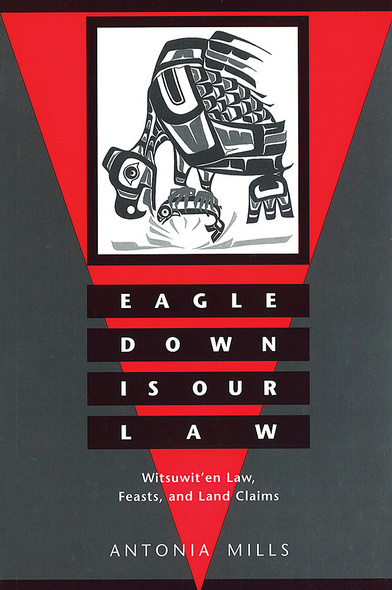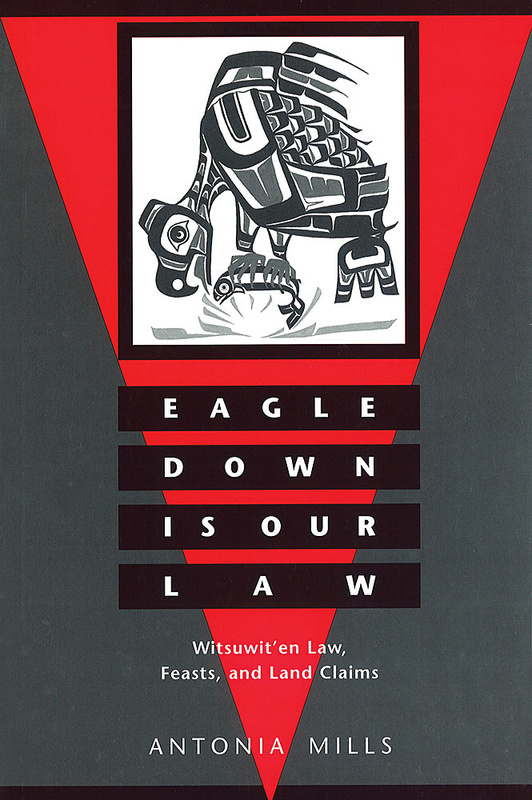Eagle Down Is Our Law is about the struggle of the Witsuwit'en peoples to establish the meaning of aboriginal rights. With the neighbouring Gitksan, the Witsuwit'en launched a major land claims court case asking for the ownership and jurisdiction of 55,000 square kilometers of land in north-central British Columbia that they claim to have held since before the arrival of the Europeans. In conjunction with that court case, the Gitksan and Witsuwit'en asked a number of expert witnesses, among them Antonia Mills, an anthropologist, to prepare reports on their behalf. Her report, which instructs the judge in the case on the laws, feasts, and institutions of the Witsuwit'en, is presented here. Her testimony is based on two years of participant observation with the Witsuwit'en peoples and on her reading of the anthropological, historic, archaeological, and linguistic data about the Witsuwit'en.
In 1991, the judge who rendered the decision in the court case, known as Delgamuukw v. the Queen, dismissed the testimony of Mills and other anthropologists and ruled that the Witsuwit'en and Gitksan have no aboriginal title.
This book contains the report that Mills rendered to the court. With its publication, the public can judge the quality of the expert opinion report for themselves. The report is introduced by Chief Gisdaywa (Alfred Joseph) of the Witsuwit'en, Chief Mas Gak (Don Ryan) of the Gitksan, anthropologist Michael Kew, and legal scholar Michael Jackson. A prologue by Mills describes the report in the context of the epic three-year court case, and an epilogue, also by Mills, describes what has happended in the provincial appeal and what the Gitksan and Witsuwit'en have done since the decision to further address the issues of aboriginal rights.
“Eagle down is sacred among the Gitksan and Witsuwit'en peoples and is a symbol of peace. It is used to sanctify the beginning of our peacemaking process ... The Gitskan and Witsuwit'en have yet to use eagle down in their dealings with the Crown in Canada. [We] have been waiting almost two centuries to make peace with the Crown ... Eagle down gives us optimism. We have kept the eagle down for thousands of years because it works. Eagle down is our law.”
- Mas Gak (Don Ryan)
UBC Press is to be commended for putting together a fine book. The numerous prologues and forwards help the reader put Ms. Mills' testimony into legal and cultural context. As for Ms. Mills' testimony itself, I am quite confident that it will ultimately emerge as a far more noble and respectable document than Chief Justice McEachern's judgment.
In ongoing discussions of the role of expert witnessing, this book will remain a significant contribution.
Eagle Down is Our Law ... marks the start of an era in which First Nations will increasingly produce their own representations of their social institutions and histories. Mill’s book provides an opportunity for non-Natives to begin to develop an understanding of the nature and operation of Witsuwit’en society.
Foreword / Disdaywa (Alfred Joseph)
Foreword / Mas Gak (Don Ryan)
Preface / Michael Kew
Preface / Michael Jackson
Acknowledgments
Prologue
1 The Nature of Witsuwit'en Society
2 The Nature and Function of the Witsuwit'en Feast
3 Genesis of the Witsuwit'en
4 Witsuwit'en Institutions
5 Witsuwit'en Law
6 The Witsuwit'en Interface with the World
Epilogue
Notes
References
Index







